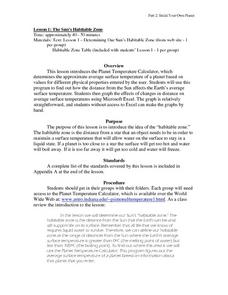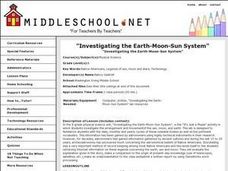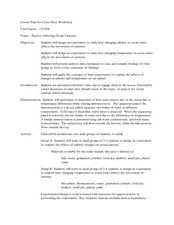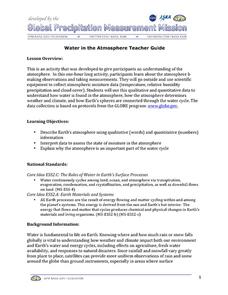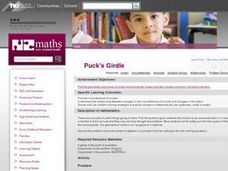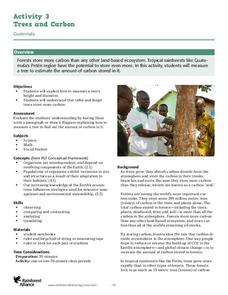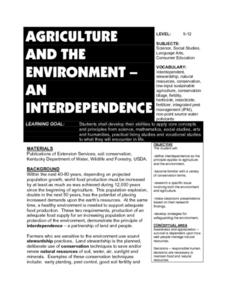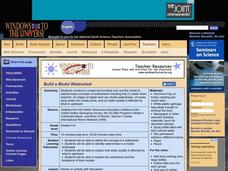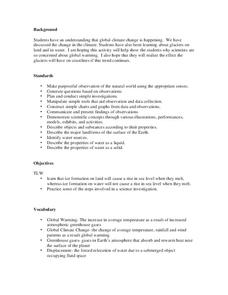Curated OER
The Sun's habitable Zone
Students explore the average surface temperature of planets. They use the Planet Temperature Calculator to find the average temperature. Students explore how the distance from the sun affects the Earth's average surface temperature. They...
Curated OER
Now We Teach Six Rs
Students explore recycling. In this ecology lesson, students sort classroom garbage into items that can be reused, reduced, or recycled. Students brainstorm ideas for reusing items and discuss ways to celebrate Earth Day at home.
Curated OER
The Periodic Table of the Elements
Young scholars examine different elements and explore how their properties play a role in technology. In this periodic table lesson plan students view a few short videos, answer questions then research the Internet to find products made...
Curated OER
Investigating the Earth-Moon-Sun System
Eighth graders research Native American legends involving the sun, moon, and stars and compare them to the origin of present day knowledge. They create a written report and make an oral presentation of their findings to the class.
Curated OER
Research Report on Earth Science Topics
Sixth graders are given a variety of Earth Science topics which be covered during the year. They select one of their choices to research and work in class and at home to meet the guidelines for their report.
Curated OER
Classifying Deep-Sea Organisms
Young scientists access the EARTH Web site in order to engage in this lesson life forms found in the ocean. Student groups of 3 - 4 choose one set of deep-sea organism images. The groups decide how they would classify their organisms and...
Curated OER
Student Tracking
Here is an interesting lesson plan on satellite tracking. Learners use various tracking techniques to find out where they go on a daily basis, what the environmental conditions are, and what they are doing during their "migrations." A...
Curated OER
Factors Affecting Ocean Currents
Students design and conduct an experiment to determine the effect of salinity and temperature changes in the movement of ocean currents. In this earth science lesson, students record observations and collect data. They share their...
California Academy of Science
Human Evolution
As the great and hilarious Tim Minchin once said, "Science is simply the word we use to describe a method of organizing our curiosity." Science is more than just a guess; it is based on questions, observations, and evidence. High...
Curated OER
Water in the Atmosphere
A slide show serves as the backdrop for a instructional activity on the moisture in Earth's atmosphere. Through it, mini meteorologists learn about the attributes of the atmosphere and actually use data-collecting weather tools to make...
Curated OER
Puck's Girdle
Fifth graders calculate the perimeters, areas, and volumes of everyday objects. They discuss the word problem involving Puck from the Shakespeare play "Mid-Summer Night's Dream," and invent and plan a method for solving the problem in...
Curated OER
Recycling and Composting
Students set up composting sites that allow food scraps and paper to be recycled by nature. They are introduced to one aspect of recycling; composting. Students see how God recycles as the worms change garbage into something that brings...
Rainforest Alliance
Trees and Carbon
You'll find everything but the kitchen sink here ... or just a carbon sink. In the activity, pairs or groups of middle school learners go outside and measure a tree's circumference and height to estimate its carbon storage potential and...
University of Colorado
Can Photosynthesis Occur at Saturn?
In the 19th activity of 22, learners determine if distance from a light source affects photosynthesis. Participants capture oxygen in straws and find that the amount of water the gas displaces is proportional to the rate of photosynthesis.
Curated OER
Following Instructions
Get scholars thinking about the scientific process with this fun experiment they can do at home. Learners practice reading directions as they underline each instruction in a procedural paragraph. They create a flow chart and record what...
BBC
Ourselves
Young biologists identify parts of the body, sort humans from other animals, and list the difference they see. Learners are split up into groups of three, and each group must find pictures in magazines of humans and other animals. They...
Curated OER
Agriculture and the Environment
Students investigate the interdependence of agriculture and the environment. They research areas of interdependence and provide examples of situations where farmers are practicing conservation in the local area. Their findings are...
Curated OER
Log Canoes: A Chesapeake Bay Tradition
This activity uses a question and answer format to scaffold students comprehension of a short dialogue about the Chesapeake Bay and its tradition of log canoes. After reading the short passage, students are prompted to find three facts...
Curated OER
Build a Model Watershed
Collaborative earth science groups create a working model of a watershed. Once it has been developed, you come along and introduce a change in land use, impacting the quality of water throughout their watershed. Model making is an...
Curated OER
Water, Water Everywhere
Learners study the location of Earth's water and study the water cycle using a terrarium. In this water study lesson, students study a model globe for the Earth and find Alaska. Learners locate the bodies of water and study an overhead...
Curated OER
Reuse and Respect!
Young scholars examine the concept of reusing trash to save the environment. In this environment lesson, students examine the definition of the word reuse, and apply it by finding ways to reuse trash in their school. They talk about what...
Curated OER
Global Climate Change
Second graders investigate the effect of melting glaciers to sea level. For this earth science lesson, 2nd graders simulate the process in the lab by conducting an experiment using ice cubes and clay. They explain the consequences of...
Curated OER
4.2: Exploring Rocks
Students collect and look at rocks and write down information about them in science notebooks. They make comparisons and sort the rocks according to their properties, and then discuss their findings with their classmates and put them on...
Curated OER
Follow the Water Cycle
Students explore the stages in the water cycle, evaporation, condensation, and precipitation. They hypothesize about the source of rain and search for forms of water on Earth.


